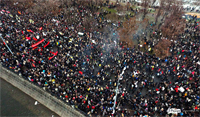
 Andrei Jvirblis, manager of TI Russia’s Public Activism group, and Gleb Gavrish, press officer of TI Russia, explore the ongoing events that have seen waves of Russians taking to the streets in recent weeks.
Andrei Jvirblis, manager of TI Russia’s Public Activism group, and Gleb Gavrish, press officer of TI Russia, explore the ongoing events that have seen waves of Russians taking to the streets in recent weeks.
Corruption is the major cause of political instability in many countries, and after questions arose about the fairness of the results of Russia’s recent parliamentary election, officials here are now facing the anger of street protesters.
Tens of thousands of people marched in the streets of Moscow and other cities to register their dissatisfaction as evidence surfaced of widespread corruption and the misuse of official power during the election.
“One could find almost anyone at a protest these days: There were very young people, ‘the new angries’ from the middle class who normally kept to themselves and older people who had been involved in similar events twenty years ago,” said Elena Panfilova, executive director of Transparency International Russia who joined the throng. “The older protesters had the chagrined look of those who had been deceived by their leaders once before.”
Transparency International Russia, which has been monitoring political corruption for almost 10 years, was not surprised by the anger. We had found the political campaign rife with examples of abuses, in particular the apparent use of government resources to boost the ruling party candidates, a clear infringement of electoral laws.
The Golos Association, which conducts independent long-term monitoring of elections and a group that worked on the election with Transparency International, suffered constant intimidation and badgering from Kremlin-backed media, prosecutors and public officials.
To date, many, political parties and civic organisations have complained about improprieties to the courts and election committees. If these violations were gathered into one lawsuit, they possibly would be grounds for declaring the elections invalid at certain polling stations or even across the country.
Our chapter made two official complaints during the campaign. One dealt with the case of a veterans’ organisation that was intimidated to vote for the ruling United Russia party by the city manager of Izhevsk, Denis Agashin. He publically stated that funding for the veterans group depended on the number of votes cast for United Russia. Agashin was found guilty but fined just 2000 roubles (about 50 euros) and he kept his job!
A group at TI Russia led by Ivan Ninenko also found major differences between the declared income of deputies running for re-election to the Duma and the data taken from tax documents (Russian press–release). Our experts compared documents presented to tax collectors with paperwork prepared for the central election commission and found 183 people had declared two different incomes.
In fact, 16 of them had a difference of more than 1 million roubles (about 25000 euros).
During the election itself, observers like Golos, the media and opposition political parties reported evidence of significant violations at polling stations. There are several efforts underway to track these differences. But it’s a struggle and one of the trackers, ruelect.com, recently had its website hacked.
Critical voices are being silenced and attacks on the media and blogs have increased. For several days, including the day of the vote, the sites of radio “Echo Moskvy” and the “Kommersant” publishing house, two powerful and independent voices in Russia, could not be accessed.
Nevertheless, the number of protesters showing their anger has grown steadily. Marches in December brought together tens of thousands of people; in the past it would have been rare to find 500 marching on the streets.
Of course, the number of arrests has also grown. On the first day of protests 300 people were detained. The next day another rally was held in the centre of Moscow and nearly two hundred were arrested. People also came out into the streets in several regions across Russia, but these rallies were broken up by police too.
Unfortunately basic human rights were violated. Many of the detainees were not given the right to a defence lawyer, there was a lack of fair administration of justice and some of the imprisoned were not fed.
TI Russia has worked with the victims and law enforcement to restore the rights of the arrested. TI Russia’s Ivan Ninenko published guidelines of protesters legal rights on Live Journal, his blog, and these were republished by many other websites and several major newspapers.
Another one thousand copies of the advice were given to protesters at the massive rally on 10 December on Bolotnaya square, along with phone numbers of lawyers and human rights activists.
We will continue this work in the coming days ahead with the next big rally slated for 24 December.
The hope remains that this surge in civic activism will lead to a concerted anti-corruption effort across Russia. More and more people are contacting us, volunteering to help us stamp out corruption. Channelling this new energy in the right direction over the next few months will be our biggest challenge.
















 Connect with us on Facebook
Connect with us on Facebook Follow us on Twitter
Follow us on Twitter